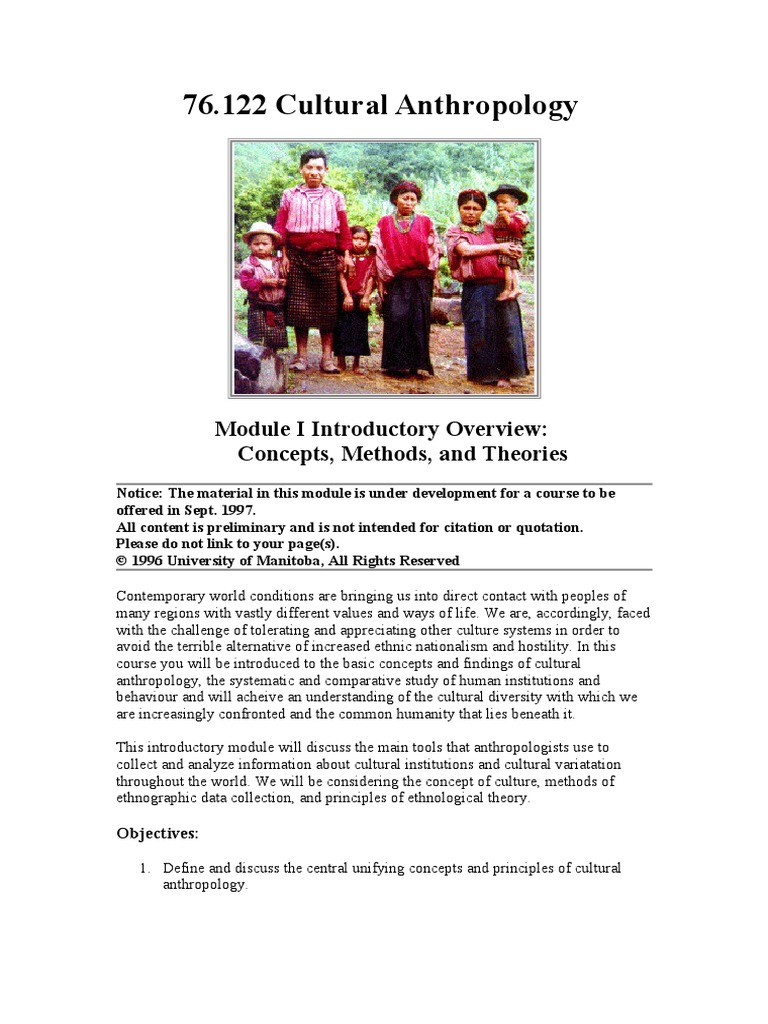In an increasingly interconnected world, one may ponder: how do cultural anthropologists dissect, compare, and interpret the myriad practices and beliefs that manifest across various societies? This question invites both intrigue and challenge, as it encapsulates the complexity and richness of human existence, and underscores the significance of cultural relativism in the study of ethnology.
At its core, cultural anthropology delves into the fabric of human life, scrutinizing the intricate web of cultural norms, values, and practices that shape societal behavior. Ethnology, as a subfield, specifically focuses on the comparative analysis of different cultures, often with a keen eye on their evolutionary trajectories and interrelations. This multifaceted pursuit raises an essential theoretical framework: cultural relativism, which posits that one must understand a culture on its own terms rather than impose external standards of judgment.
Attempts to appreciate cultural variances through the lens of relativism require one to first dismiss ethnocentric biases. Ethnocentrism denotes the inclination to view one’s own culture as superior; it colors interpretations and can lead to misinterpretations. Cultural anthropologists strive to cultivate an empathetic understanding that disentangles preconceived notions, thereby allowing for a more nuanced analysis of diverse societies.
The methodology employed by cultural anthropologists is as complex and diverse as the cultures they study. Ethnography serves as a primary research tool, encompassing immersive fieldwork, participant observation, and interviews. Through these strategies, anthropologists collect qualitative data, enabling them to construct a detailed portrait of cultural dynamics. However, this raises inquiries regarding objectivity: can one truly dissociate from their own cultural milieu when studying others?
This dichotomy of observer and observed has led to numerous debates within the field. Critics argue that anthropologists’ interpretations are inevitably biased by their own cultural lenses. Yet, proponents of cultural relativism assert that this very subjectivity can enrich analyses, creating a tapestry that reflects a plethora of perspectives. Thus, the challenge lies in striking a balance between subjective insight and objective inquiry.
Analyzing cultural practices through a relativistic lens necessitates rigorous contextualization. For instance, rituals that might seem untenable or peculiar from one vantage point could bear profound significance within their cultural context. Take, for example, the Kumbh Mela in India, a mega-hindu pilgrimage that gathers millions from across the globe. To a foreign observer unfamiliar with its religious connotations, the event may appear chaotic or cumbersome. Yet, understanding it through cultural relativism reveals its intricate layers of spirituality, community cohesion, and historical continuity.
Moreover, cultural anthropologists often engage with the concept of ‘cultural diffusion,’ which suggests that cultures do not exist in isolation. This interconnectedness prompts a comparative approach, as anthropologists examine how cultures influence one another, share practices, and adapt over time. Take, for instance, globalization and its impact on indigenous cultures. Anthropologists studying these phenomena grapple with questions of agency and authenticity: when cultural elements merge, do they dilute or transform original identities?
One profound aspect of cultural relativism is its application in contemporary societal issues. In a world grappling with cultural clashes and misunderstandings, cultural anthropologists are tasked with facilitating dialogues that transcend mere tolerance, aiming instead for profound comprehension. Understanding practices such as arranged marriages or polygamy through a relativistic lens challenges individuals to reconsider their preconceived judgments and engage more respectfully with the complexities of other cultural practices.
The reflexivity of cultural anthropologists is vital in this endeavor. Being reflective about one’s own positionality, biases, and privileges fosters a more holistic approach to ethnology. When anthropologists openly acknowledge the lens through which they observe and interpret cultural practices, they enrich their analyses while also establishing a more credible rapport with the communities they study.
Yet, while cultural relativism provides an essential framework for understanding and appreciating diversity, it is not without its critics. Some argue that it may inadvertently condone practices that violate human rights, citing examples such as female genital mutilation or child marriage. Herein lies the crux of the challenge: how do cultural anthropologists navigate the delicate balance between respect for cultural practices and advocacy for universal human rights? This complex intersection raises ethical dilemmas, forcing anthropologists to confront their roles not merely as observers but as potential advocates for change.
In light of these challenges, the field of cultural anthropology continues to evolve. The advent of digital ethnography, for instance, allows anthropologists to explore cultures online, studying phenomena such as digital communities and virtual identities. This modern approach broadens the scope of ethnological comparison and has implications for understanding cultural shifts in a globalized world.
Ultimately, understanding how cultures are compared and studied through cultural relativism invites a deeper appreciation for the rich mosaic of human existence. Cultural anthropologists traverse the intricate landscape of societal norms, beliefs, and practices, fostering dialogues that honor diversity while navigating the challenges of interpretation. As we reflect on these methodologies and their implications, we are reminded that the study of culture is not just an academic pursuit; it is a journey toward empathy, understanding, and a shared human experience.
